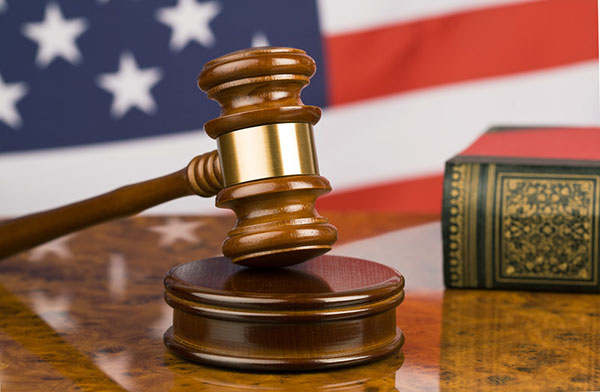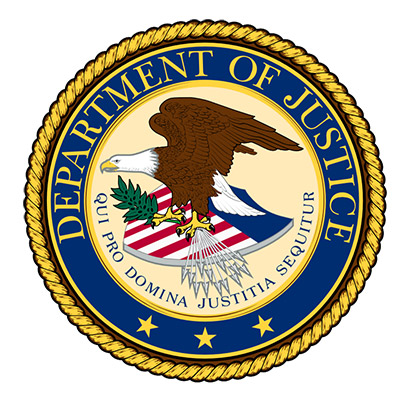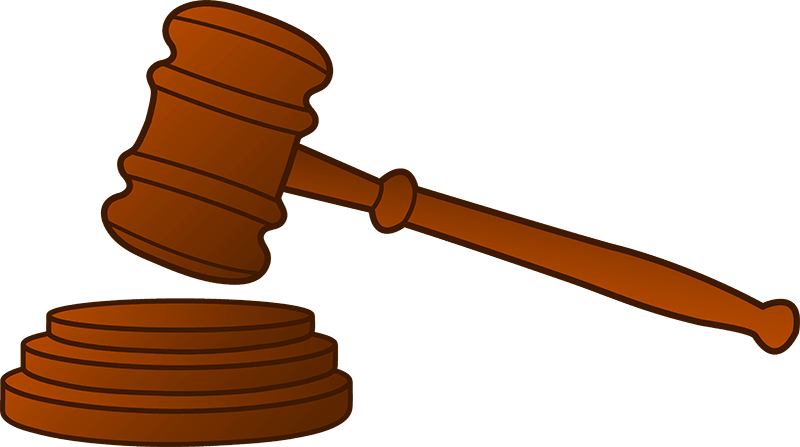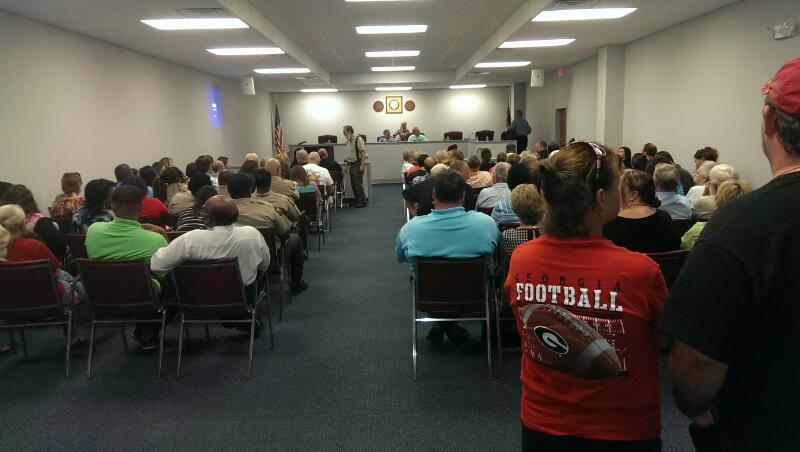
The following is a summary of the trial of United States vs. Wiley Griffin et al. We are attempting to be as accurate as possible in reporting the trial, given the restrictions on recording equipment within the courtroom. The article contains statements and claims made in court by attorneys and witnesses during the course of opening statements and testimony. Those statements and claims do not represent the views or opinions of Sowegalive.com or its parent company, Flint Media Inc.
The trial of the four Sheriff’s deputies indicted by a federal grand jury in connection with an incident at the 2012 Bainbridge Bikefest continued Monday, June 8 in Albany, Ga.
Defense Witness – Jacob Bush
The last witness called by the defense, who had only opened its evidence on Friday, was Grady County Sheriff’s deputy Jacob Bush.
Jacob Bush is a patrol sergeant with Grady County Sheriff’s Office. Bush said he has known Wade Umbach for 21 years, since the two were 16 years old. Bush testified that he believed Umbach was “an absolutely truthful person.” However, he had no firsthand knowledge of what happened at the 2012 Bainbridge Bikefest.
Another character witness called on behalf of Umbach was Wesley McKenzie, the pastor of a church in Grady County, Ga. Pastor McKenzie said he had known Umbach for about 5 years and said Umbach joined his church about 4 years ago. McKenzie also gave a positive opinion of Umbach’s trustworthiness.
Rebuttal – Prosecution recalls Julian Crowder
The prosecution recalled Deputy Julian Crowder on Monday, Sept. 8. U.S. Attorney Christine Siscaretti asked Crowder specifically about conversations he had with Chip Nix about what he had seen that night at Bikefest. Crowder and Nix were partnered together on a golf cart on the night of the incident, but Crowder later testified that he believed Nix was not trustworthy.
Handed a copy of his testimony to a federal grand jury, Crowder recalled that Nix had told him that Saturday night at Bikefest that he had seen Wiley Griffin IV strike Parrish, not Chris Kines. Crowder said Nix’s main concern was that it “just wasn’t right” that Kines was claiming to be the one to hit Parrish, when Nix had allegedly seen Griffin IV delivering blows.
Under cross-examination by defense attorney Charlie Cox, Crowder said Nix never mentioned Wiley Griffin IV having a flashlight.
Cox: “When you offered to go with him to talk with the Georgia Bureau of Investigation, did he take you up on it?”
Crowder: “No, he did not.”
Rebuttal – Prosecution recalls Robby Lynn Webb
Also on Monday, June 8, the prosecution recalled Robby Lynn Webb, who was chief of Bikefest volunteer security in 2012. Webb said he was about 10-15 feet away from Parrish when he saw Parrish taking a “beating on the right side of his face.” However, Webb said he was unsure whether he saw a flashlight.
Defense attorney Cox asked Webb if he hard someone yell “Get your hand off my gun” before seeing Parrish struck, and Webb said he had. Defense attorneys questioned whether Webb, who said he was trying to hold back a crowd of onlookers from interfering with deputies, would have been in position to see Parrish clearly.
Defense attorney Kermit Dorough asked Webb to recall telling an investigator that when he saw Parrish struck, Parrish was still struggling, and Webb said that was true.
Under further questioning from Dorough, Webb said he had told Parrish “4-5” times to “stay back” from where deputies were. Webb said he had known Parrish for many years and believed that Parrish appeared drunk as he walked over to where deputies were detaining his stepfather, Mark West.
Jury given instructions
Both the prosecution and defense had a chance to submit proposed instructions to the jury. The judge accepted some of those instructions, while others were variously objected to, revised and some left out altogether. The judge’s instructions to the jury, which were delivered after lunch on Monday, was essentially an explanation of the laws behind the 7 counts the 4 defendants were indicted on.
The judge began by telling the jury:
“These are the rules of law you must follow and apply. Following closing arguments, you will go to the jury room to deliberate.
You must not be influenced by sympathy or prejudice for either the prosecution or the defense. You must follow the law as I give it to you, whether or not you agree with the law.”
Closing arguments begin
Due to several lengthy breaks from trial proceedings, in which the judge either considered matters in his chambers or the jury was not present for discussion, closing arguments didn’t get underway until about 3 p.m. Monday.
U.S. Attorney Christine Siscaretti, who is co-prosecuting the case with U.S. Attorney Risa Berkower, gave the government’s opening statement. She began her statement by repeating words defendant Wiley Griffin IV allegedly told his then-girlfriend, Brooke Brown, after the incident which injured Parrish. Essentially, the prosecution claims Griffin IV told Brown he had just beat someone up with a flashlight and asked her not to tell anyone.
Siscaretti said that while Aaron Parrish admitted he had been drinking earlier in the day of the incident, and didn’t remember every specific detail of the altercation with deputies, his “memory of feeling himself being hit with a flaslight is 100 percent.” Parrish, the prosecutor said, had lots of pain and suffered vision problems for days. It took several months for Parrish’s cuts and bruises to heal and for his eye to stop swelling.
Siscaretti even suggested that a picture of Parrish taken by Sheriff Deputy Jim Morris that night shows a long bruise down the right side of Parrish’s face; she said the bruise was not caused by a fist, or by Parrish falling down on a trailer hitch (as the defense had suggested), but rather as the result of being hit with a flashlight.
Siscaretti also asked the jury to consider that former Sheriff’s deputy Chip Nix was telling the truth when he testified he saw Wiley Griffin IV allegedly strike Parrish with a flashlight. Nix, she said, admitted he should have come forward with his account before the FBI got involved, but was worried about retaliation at his workplace.
Siscaretti continued to Count 2, which accuses Liz Croley of violating Parrish’s right to a fair trial with the allegation she withheld a witness statement that said Mike Green, not Parrish, struck Liz Croley. Parrish was convicted of a felony charge of obstructing law enforcement in February 2013. Liz Croley’s incident report, which says Norma McIntyre’s account was that Parrish struck Croley (when really McIntyre claimed she saw Green) was a crucial inaccuracy, Siscaretti argued.
“[The incident report] gave Aaron Parrish’s attorney no reason to think that Norma McIntyre had anything useful. Autumn Webster interviewed several state witnesses, even reached out to Norma McIntyre … but had no reason to think that McIntyre was anything but a witness against Aaron.”
Even if McIntyre got the names of who she saw mixed up, as the defense alleged, McIntyre’s statement still could have been useful to Parrish’s attorney because she could have used it to question the inconsistency in Croley’s incident report, the U.S. attorney said.
Siscaretti continued with a review of the remaining five counts, which deal with false reports and tampering with witnesses.
“You know their cover story has been blown apart,” Siscaretti told the jury as she ended her statement. “The government will ask you to hold the defendants guilty as charged.”
1st closing statement by defense: Charlie Cox
The theme of the closing statement by Charlie Cox, attorney for defendant Wiley Griffin IV, was to suggest “this is what reasonable doubt looks like” when describing what he said were issues with the prosecution’s case.
“When an officer hears another officer yell, ‘Get your hands off my gun,’ how long should he wait?” Cox began his statement.
Should the officer wait until someone has their hands on an officer’s gun, or wait still longer until someone is shot before acting? Cox asked. Or should the officer instead act immediately after hearing of the threat, to make sure no one gets hurt?
Cox talked about the standard of reasonable doubt, as part of the jury’s instructions contain statements to the effect that the government “must prove the charges beyond a reasonable doubt.”
Cox said reasonable doubt can be caused by a lack of evidence, or by a conflict in the evidence. Witness Chip Nix, the only witness to both say he saw Wiley Griffin IV involved in the altercation and also saw Griffin IV wield a flashlight, is central to the case, according to Cox.
Cox questioned Nix’s truthfulness, both in testifying to the grand jury and in the current trial, several times during his closing statement. Cox also questioned the testimony of Brooke Brown and Vincent Edmond, who were personal acquaintances of Griffin IV.
Cox referred the jury back to the testimony of defense witness Dwayne Williams, a Bikefest security guard who testified he saw Parrish raising his hands in closed fists, and then saw Croley fall back onto the ground. Williams had just detained the suspect in an earlier altercation at Bikefest after finding him at Don Green’s campsite.
Cox recalled how defense witness Macon Moore also testified he saw Parrish hit Liz Croley and testified he watched Parrish continue to struggle with deputies even after being taken to the ground. Moore claimed he did not see Griffin IV at the scene of the altercation, in which Moore was also knocked to the ground.
Cox also suggested Nix had filled in gaps of Parrish’s memory of the incident, noting that both men recalled hearing “the rattle of flashlight batteries.” Cox also suggested something improper about Brown contacting Nix and his wife shortly after receiving a witness subpoena for the trial, even though Nix claimed it was about an unrelated matter.
“If you believe Mr. Nix, all he did was stand there and watch someone use excessive force [against Parrish],” Cox said. “He didn’t report the excessive force to anyone. It’s implausible.”
Cox wrapped up his closing statement by talking about what he saw as the jury’s role in the trial.
“At the end of the day, I’ve got to trust that the jury upheld their oath to consider the evidence in a fair and impartial manner,” Cox said. “I trust that you will hold the government accountable for presenting proof beyond a reasonable doubt.”
Cox referred back to the jury’s instructions in which they were told several things about “reasonable doubt,” including that information they considered “beyond a reasonable doubt” was of the sort they would use to make a decision about the most important affair in their own life.
“The only proper verdict is to tell Mr. Griffin, ‘Not only are you innocent, you are not guilty.'”




Be the first to comment